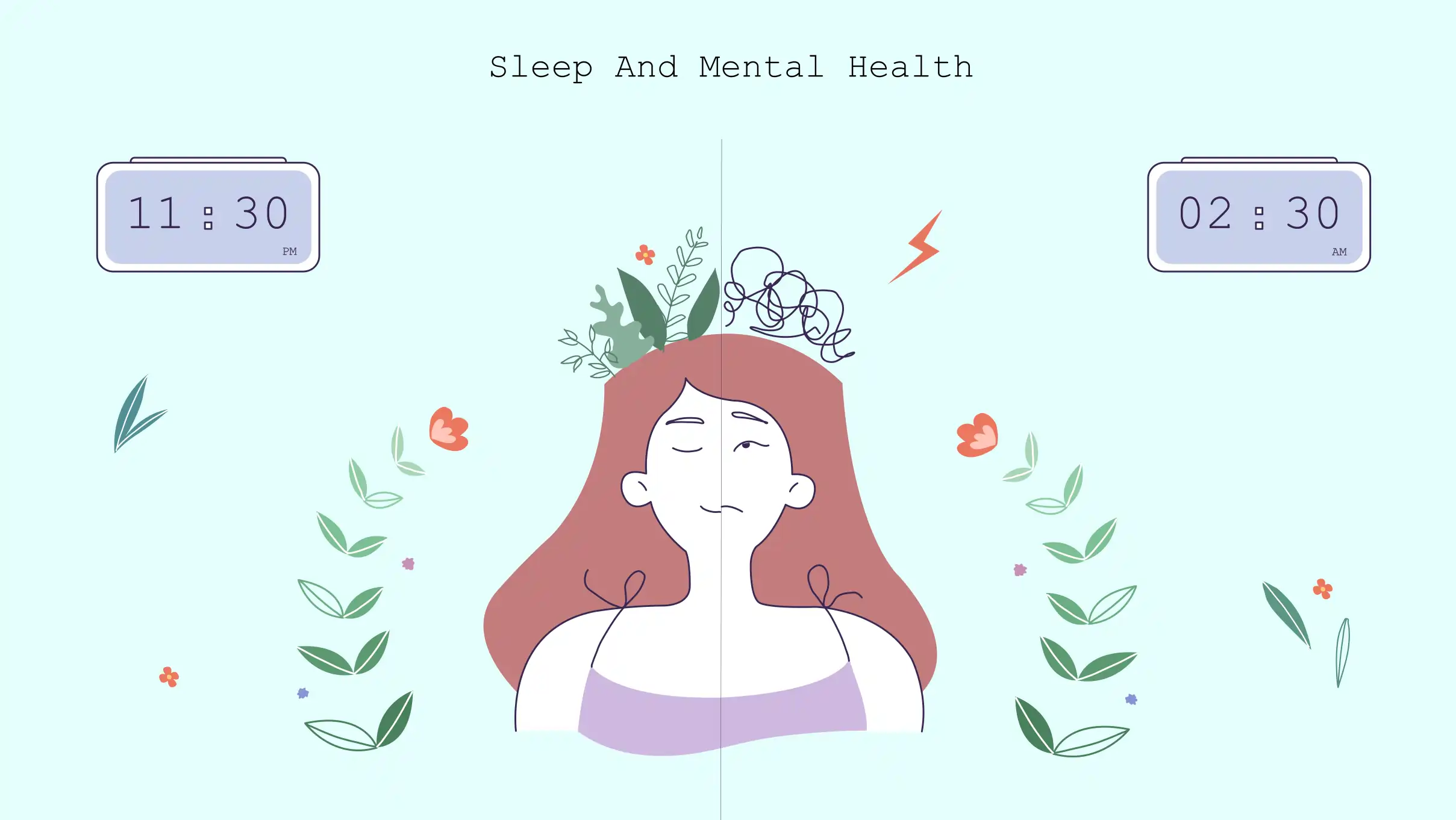Mental Health And Sleep
Written by


Sleep and mental health are crucial for a healthy life. However, work-life balance, relations, social interactions, unchecked bucket lists, health issues, and non-ending expenses slam your mind each night, making you anxious as you hit the sack.
Your sleep is on the back foot, and your eyes are wide open. At 4 AM, you are fortunately endowed with sleep. But alas! In 2 hours, you wake up for the office. And the anxiety instantly creeps in! A vicious cycle! Have you ever wondered whether mental health leads to a sleep disorder or vice versa? What comes first? The chicken or the egg?
Let’s know the relationship between sleep and mental health and what steps we should take to mitigate the issues.
How Sleep and Mental Health are Related
Our body rests and restores itself while sleeping. Sufficient sleep improves memory and learning, increases attention span and creativity, and concentration and decision-making abilities. Moreover, the cells are healed and repaired, and the hormones are balanced during rest.
Sleep does have a profound effect on emotions and cognitive health. When a person is in REM sleep, the brain effectively processes emotional information. However, the lack of sleep hinders the evaluation process. The mood is influenced when the emotions are left unattended by the brain. Consequently, suppressed emotions can lead to mood disorders and the risk of suicidal behaviours.
Moreover, mood disorders can lead to stress and anxiety. Study shows that women in India suffer from mental health disorders amounting to 39% for stress and 30% for anxiety disorders. Additionally, 33% of men suffered from depression compared to 31% of women in 2021.
Obstructive sleep apnea is a sleep disorder where a person’s breathing process frequently pauses while sleeping. People suffering from psychiatric conditions mostly have OSA disorders and are related to mental health. Therefore, we can say there is a correlation between sleep and mental health. On the other hand, getting a proper 6-7 hours of sleep will give you more sound physical and cognitive health.
Mental Health Problems Related to Sleep
Do you know which mental health issues cause trouble sleeping? Knowing the psychological effects of sleep deprivation will help you to avert any major disease in the future.
Depression
Depression is a mood disorder which arouses feelings of sadness and hopelessness. Prolonged sad feelings can lead to insomnia and anxiety. A survey shows that 56 per cent of youngsters in the UK reported anxious feelings. Another survey showed work-related stress, anxiety, and depression in approximately 822,000 workers.
It is believed that sleep disorders are caused due to depression; however, it has also been noticed that sleep disorders can cause depression. It is the bi-directional association between the two. It is a vicious circle where differentiating the cause and effect of sleep disorder and depression is impossible. The ideal solution to mitigate depression disorder is to improve sleep quality.
Seasonal Affective Disorder
Seasonal affective disorder is a type of recession that most people face during the time of the year when the daylights are reduced, and there is darkness and a gloomy atmosphere. Most people feel deep despair, loneliness, loss of hope, and fear of the season. People staying in the northern part suffer from SAD during the winter season. It saps their energy. For some, it may feel like drowning in darkness. They either sleep too little or too much and feel heaviness on their shoulders. The depression continues till the summer starts, affecting the internal body clock known as circadian rhythm, which controls many body functions, including sleep. Thus, SAD patients’ sleep cycle is affected.
Anxiety Disorder
Anxiety disorder creates fear that affects everyday life and leads to diabetes and heart problems. Anxiety disorders include:
- generalised anxiety disorder
- social anxiety disorder
- panic anxiety disorder
- obsessive-compulsive disorder
- post-traumatic stress disorder
Anxiety disorder does affect sleep as a person’s mind is always racing. The fear of something wrong happening in the future causes stress in the body by releasing the hormone adrenaline. The hormone is produced when the brain is in alert mode to protect against danger.
Bipolar Disorder
Bipolar disorder is a disease with a shift in a person’s mood, emotions, and behaviour. People may have mood episodes that may be high (mania) or low (depression). Depending on the episodes, there are different symptoms; however, they have a major impact on daily life. Sleep is dependent on the person’s emotional state. It is lessened in the mania period and excessive in the depression period. A change in sleep pattern is observed before the onset of an episode.
As bipolar disorder affects sleep, it is observed that less or excessive sleep also can cause or worsen bipolar disorder disease due to bi-directional association. The treatment of bipolar disorder will improve sleep quality.
Schizophrenia
Schizophrenia is a cognitive disorder where a person is unable to interpret reality. They suffer from hallucinations, disordered thinking and behaviour patterns. The abnormal living pattern has a major impact on their routine life. Schizophrenia patients are most likely to suffer from insomnia and circadian rhythm disorders. Moreover, the medicines prescribed for schizophrenia may lead to sleep issues. Hence, it is recommended to treat sleep disorders to cure schizophrenia disease.
ADHD
Attention deficit hyperactivity disorder (ADHD) is a neurodevelopmental disorder where the patient’s attention span is reduced and an increase in impulsiveness is observed. The disease is observed mostly in children and is continued in adulthood. ADHD patients have difficulty falling asleep, obstructions in sleep, and sometimes excessive sleepiness. The symptoms of ADHD, such as difficulty focusing on a single task, daydreaming, irritation, and impatient behaviour, make it hard to nap for the patients.
However, it is also observed that slumber disorders can also lead to ADHD problems as less sleep reduces attention span and enhances impulsiveness. Thus, it will be beneficial if proper sleep treatment is provided to ADHD patients.
Autism Spectrum Disorder
Autism spectrum disorder is a mental disorder which includes several neurodevelopmental conditions that affect communication and social interaction, restricted and repetitive behaviours. Patients who have ASD have separate ways of learning, understanding, and implementing things.
The disease is diagnosed mostly in children that continue in adulthood. Children facing autism have sleeping difficulties, as the disease is also related to insomnia. Autism children also suffer from breathing problems that affect their rest at night. Lack of sleep further worsens the symptoms of ASD and impacts the life quality of patients. A proper cure for insomnia and other bedtime disorders will help lessen the problem.
Interaction of Mental Health Conditions
Interaction of cognitive health conditions means a single mental health issue could arise due to the cumulative effect of numerous other mental health conditions. Mind health issues never work in isolation. For example, a person suffering from anxiety also suffers from depression. Furthermore, anxiety and depression can also lead to insomnia and other sleep disorders. Thus, it is vital to take care by treating the root cause of any health condition and being mindful of overall mental health development.
How Could Mental Health Problems Affect Your Sleep
As sleep can affect your cognitive health, mental health problems too can affect your sleep. It is called a bidirectional association between sleep and mental health. Read below to know how does sleep affects mental health.
- Anxiety causes fear and worry that keep people awake. Thoughts keep running in mind when a person is trying to sleep.
- Depression can make a person sleep longer and also can cause insomnia.
- Trauma affects sleep as the person imagines nightmares and feels unsafe, leading to stress and sleeplessness.
- Paranoia is a mental disorder where people hear voices or see things that frighten them. Thus, they remain awake at night, affecting their sleep.
- Psychiatric medications can cause side effects such as insomnia, nightmares, and excess sleep.
Ways To Improve Both Sleep And Mental Health
Besides medications, the following ways will help you enhance your sleep and mental health.
Cognitive Behaviour Therapy
It is counselling done by psychologists in talk therapy. The thinking patterns of a person are examined thoroughly by a therapist. Different types of CBT have been developed for mental issues. CBT-i has helped in treating insomnia by reducing sleep problems. The therapy helps the person adapt to lifestyle changes aligned with the body’s circadian rhythm. The therapist helps to tackle a person’s beliefs, negative thoughts and behaviours around sleep. The thoughts are replaced with habits that help the person enjoy a sound sleep. Thus, CBT-i is recommended for insomnia patients suffering for a longer period.
Improve Sleep Habits
How does sleep improve mental health? The following habits will improve your sleep and, eventually, your cognitive health.
- Set a bedtime routine and follow it diligently
- Avoid heavy meals, tea, caffeine, and alcohol before sleep
- Daily exercise and exposure to sunlight are essential for sleep
- Try relaxation techniques such as meditation and journaling that will calm down your stressful mind
- Have a warm bath before sleep
- Try red light therapy to boost your sleep
- Use mattresses and pillows that aid in comfortable sleep
Once you know what bedtime ritual works for you, continue the habit consistently to get better results in the long run.
Conclusion
Now that you know how sleep and mental health are correlated, you will start understanding your physical and psychological health patterns. Follow the bedtime rituals till you get the desired outcome and take charge of your mental health and sleep.
Most importantly, don’t stress over what comes first. The chicken or egg? Let it get solved on its own!
FAQs
Is lack of sleep part of mental health?
It is clearly perceived that sleep issues can contribute to the beginning and worsening of a variety of mental health issues, including sadness, anxiety, and even suicidal thoughts. However, insomnia can also be a sign of psychiatric diseases, such as anxiety and depression.
What mental illness causes trouble sleeping?
About 50% of cases of insomnia are influenced by psychological stress, stress, or anxiety. The characteristics of symptoms are frequently useful in identifying the contribution of mental illness to their inability to sleep.
How does sleep improve mental health?
The brain’s ability to interpret emotional information is facilitated by getting enough sleep, particularly REM sleep. The brain works to analyse and retain thoughts and memories when we sleep, and it appears that lack of sleep is particularly detrimental to the retention of emotionally positive information.
Can lack of sleep lead to psychosis?
Yes, most people typically start experiencing the first few symptoms within 24 to 48 hours of not sleeping. These symptoms typically include inaccurate perception, stress, and agitation.
people like this article
Written by








